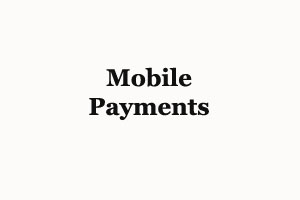When will Mobile Payments Take Off?
Within four years, says a KPMG survey. As companies race to take advantage of the mass adoption of smartphones to offer mobile payment services, executives believe the use of a mobile device to make payments or conduct banking transactions will require four years to become widely accepted by consumers.
This is revealed by a global survey of business executives by KPMG International, a global network of firms providing audit, tax, and advisory services.
The KPMG survey of nearly 1,000 executives in primarily the financial services, technology, telecommunications, and retail industries globally found that 83 percent of the respondents believe that mobile payments will be mainstream within four years, compared to only nine percent who see them as mainstream today. In fact, 46 percent believe mobile payments will be mainstream within two years.
“We believe that exploding smartphone growth and myriad opportunities will grow mobile payments at a much faster rate than our respondents anticipate,” said Gary Matuszak, KPMG Global Chair of the Technology, Communication and Entertainment practice.
Seventy-two percent of the executives said that mobile payments are now or will be reasonably important in the future, with specialist online systems building on its leading position as a payment method, and m-banking and near field communication (NFC) gaining significantly greater traction than today.
Fifty-eight percent said they have a mobile payments strategy in place.
While the majority of the business leaders surveyed believe consumers are currently concerned about security and privacy when using mobile devices, they believe other factors are more compelling attributes of a successful mobile payment strategy.
Specifically, 81 percent believe convenience/accessibility is the highest attribute, followed by simplicity/ease of use, at 73 percent, security, at 57 percent, and low cost, at 43 percent.
At the same time, business leaders, globally and in the U.S., view security as the main challenge to developing mobile payments strategies. Technology and adoption of the technology is a distant second, followed by privacy.
With the mobile payments industry poised to make a major leap in the coming years, several players are expected to play significant roles, though two groups of financial institutions are the current front-runners, says KPMG quoting respondents.
Banks, which scored the highest in level of importance in the value chain, and credit card companies will have the most important roles, the survey says.
It placed telecommunications companies third, ahead of specialist online payment players (such as PayPal, Boku, Obopay), online service provider companies (such as Google, Facebook, Amazon), retailers and technology companies.
Among U.S. respondents, online service providers placed third, followed by specialist online payment players and telecommunications companies, which were rated of equal importance, retailers and technology companies.
Respondents said that specialist online systems have the greatest prospect for success, followed by mobile banking, NFC, carrier billing and the “mobile wallet.”
Mobile Payment Methods
M-wallet – uses mobile device as a wallet with account and transaction information stored on the devices’ SIM card.
M-banking – direct access to bank services and information via the mobile device
NFC – short-range (millimeters) wireless communication technology that enables exchange between devices, such as between a cell phone and a point of sale device at a checkout counter.
Specialist Online systems – online payment processing systems such as Google checkout and PayPal.
Carrier billing – purchases are charged to the mobile phone bill
The Global Mobile Payments survey examined the leaders, opportunities, advantages and barriers in mobile payments, and was carried out by KPMG’s global Information, Communications and Entertainment practice. The survey results were announced today, July 13.






